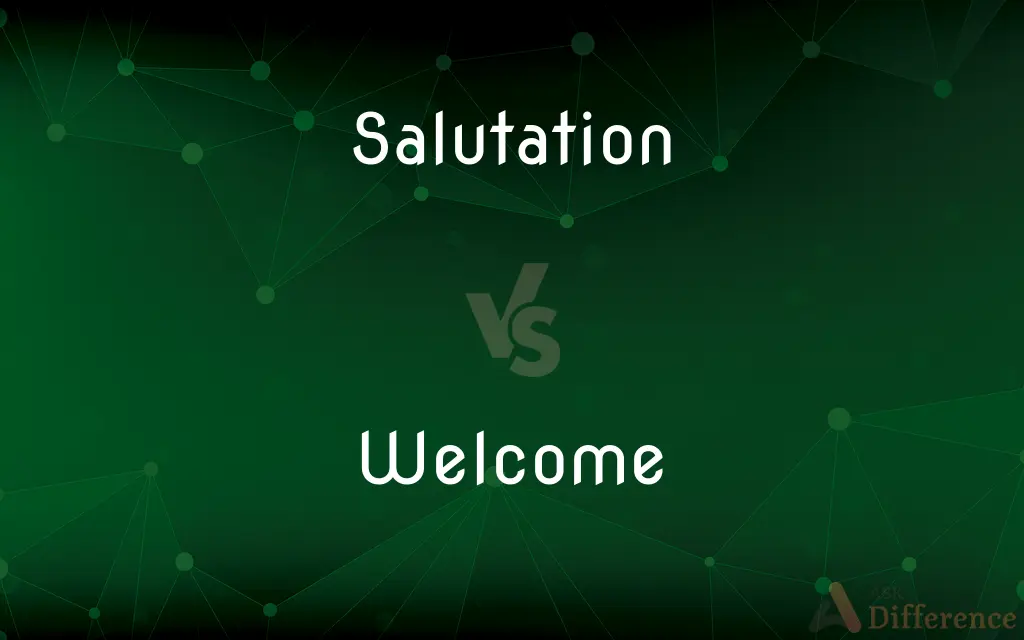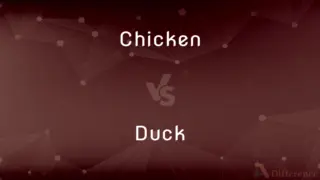Salutation vs. Welcome — What's the Difference?
By Maham Liaqat & Fiza Rafique — Updated on May 13, 2024
Salutation is a formal or polite gesture or remark used at the beginning of a communication, while welcome is an expression of hospitality or a greeting to a newcomer.

Difference Between Salutation and Welcome
Table of Contents
ADVERTISEMENT
Key Differences
Salutations are formal gestures or phrases used at the start of a conversation or written communication, like "Dear" or "Hello". Welcome, on the other hand, is often used to greet someone arriving, such as saying "Welcome!" when someone enters a place.
Salutations can vary based on the formality of the situation and the relationship between the parties, ranging from casual greetings to formal addresses. Welcome is used more uniformly to express warmth and acceptance regardless of the formality of the situation.
Salutations are essential in written correspondence and are tailored to fit the communication style, whether in emails, letters, or professional messages. Welcome is more commonly used in direct verbal interactions or in signs at gatherings or establishments.
Salutations may include titles and last names to show respect, especially in professional or formal contexts. Welcome tends to be more inclusive and general, not typically involving the personalization of addressing someone by name.
Salutations serve as an opening to further communication, setting the tone for the interaction. Welcome aims to make individuals feel appreciated and accepted in a new environment or group.
ADVERTISEMENT
Comparison Chart
Usage Context
Beginning of communication
Greeting someone arriving
Formality
Can be formal or casual
Generally warm and inviting
Common Settings
Emails, letters, formal meetings
Gatherings, homes, public places
Personalization
Often includes titles and last names
Usually general without personalized names
Purpose
To initiate communication
To make someone feel accepted and comfortable
Compare with Definitions
Salutation
A greeting used in written or verbal communication.
She started her letter with the salutation Dear Mr. Smith.
Welcome
An expression of hospitality to a newcomer.
The host said a warm welcome to all the guests.
Salutation
An act of greeting someone respectfully.
His nod was a subtle salutation as he entered the room.
Welcome
Used to greet someone arriving in a new place.
The sign at the airport read, Welcome to New York.
Salutation
An opening line in an email or letter.
The salutation To whom it may concern is often used in formal requests.
Welcome
A reception or party given for a new arrival.
They threw a welcome party for the new members.
Salutation
A formal gesture of greeting, especially in a ceremonial context.
The meeting opened with the traditional salutation.
Welcome
A feeling of acceptance or approval.
His innovative ideas received a welcome response from the team.
Salutation
A polite expression of recognition or acknowledgment.
He offered a salutation to the audience before beginning his speech.
Welcome
A welcome is a kind of greeting designed to introduce a person to a new place or situation, and to make them feel at ease. The term can similarly be used to describe the feeling of being accepted on the part of the new person.
Salutation
A salutation is a greeting used in a letter or other written or non-written communication. Salutations can be formal or informal.
Welcome
An instance or manner of greeting someone
You will receive a warm welcome
He went to meet them with his hand stretched out in welcome
Salutation
A polite expression of greeting or goodwill.
Welcome
Used to greet someone in a polite or friendly way
Welcome to the Wildlife Park
Salutation
Salutations Greetings indicating respect and affection; regards.
Welcome
Greet (someone arriving) in a polite or friendly way
Hotels should welcome guests in their own language
Salutation
A gesture of greeting, such as a bow or kiss.
Welcome
(of a guest or new arrival) gladly received
I'm pleased to see you, lad—you're welcome
Salutation
A word or phrase of greeting used to begin a letter or message.
Welcome
Very pleasing because much needed or desired
The news will be most welcome to those whose jobs will now be safeguarded
After your walk, the tea room serves a welcome cuppa
Salutation
A greeting, salute, or address; a hello.
Welcome
Allowed or invited to do a specified thing
We arrange a framework of activities which you are welcome to join
Salutation
The act of greeting.
Welcome
Received with pleasure and hospitality into one's company or home
A welcome guest.
Salutation
(obsolete) Quickening; excitement.
Welcome
Giving pleasure or satisfaction; agreeable or gratifying
A welcome respite from hard work.
Salutation
The act of saluting, or paying respect or reverence, by the customary words or actions; the act of greeting, or expressing good will or courtesy; also, that which is uttered or done in saluting or greeting.
In all public meetings or private addresses, use those forms of salutation, reverence, and decency usual amongst the most sober persons.
Woe unto you, Pharisees! for ye love the uppermost seats in the synagogues, and greetings in the markets.
When Elisabeth heard the salutation of Mary, the babe leaped in her womb.
I shall not trouble my reader with the first salutes of our three friends.
Welcome
Cordially or willingly permitted or invited
You are welcome to join us.
Salutation
An act of honor or courteous recognition;
A musical salute to the composer on his birthday
Welcome
Used in the expression you're welcome to acknowledge an expression of gratitude.
Salutation
(usually plural) an acknowledgment or expression of good will (especially on meeting)
Welcome
A cordial greeting or hospitable reception given to an arriving person.
Salutation
Word of greeting used to begin a letter
Welcome
A reception upon arrival
Gave the stranger an unfriendly welcome.
Welcome
The state of being welcome
Don't overstay your welcome.
Welcome
To greet, receive, or entertain (another or others) cordially or hospitably.
Welcome
To receive or accept gladly
Would welcome a little privacy.
Welcome
Used to greet cordially a visitor or recent arrival.
Welcome
Whose arrival is a cause of joy; received with gladness; admitted willingly to the house, entertainment, or company.
A welcome visitor
Refugees welcome to education!
Welcome
Producing gladness.
A welcome present;
Welcome news
Welcome
Free to have or enjoy gratuitously.
You are welcome to the use of my library.
Welcome
Greeting given upon someone's arrival.
Welcome
The act of greeting someone’s arrival, especially by saying "Welcome!"; reception.
Welcome
The utterance of such a greeting.
Welcome
Kind reception of a guest or newcomer.
We entered the house and found a ready welcome.
Welcome
The state of being a welcome guest.
Welcome
To affirm or greet the arrival of someone, especially by saying "Welcome!".
Welcome
To accept something willingly or gladly.
We welcome suggestions for improvement.
Welcome
Received with gladness; admitted willingly to the house, entertainment, or company; as, a welcome visitor.
When the glad soul is made Heaven's welcome guest.
Welcome
Producing gladness; grateful; as, a welcome present; welcome news.
Welcome
Free to have or enjoy gratuitously; as, you are welcome to the use of my library.
Welcome
Salutation to a newcomer.
Welcome
Kind reception of a guest or newcomer; as, we entered the house and found a ready welcome.
His warmest welcome at an inn.
Truth finds an entrance and a welcome too.
To thee and thy company I bidA hearty welcome.
Welcome
To salute with kindness, as a newcomer; to receive and entertain hospitably and cheerfully; as, to welcome a visitor; to welcome a new idea.
Thus we salute thee with our early song,And welcome thee, and wish thee long.
Welcome
The state of being welcome;
Don't outstay your welcome
Welcome
A greeting or reception;
The proposal got a warm welcome
Welcome
Accept gladly;
I welcome your proposals
Welcome
Bid welcome to; greet upon arrival
Welcome
Receive someone, as into one's house
Welcome
Giving pleasure or satisfaction or received with pleasure or freely granted;
A welcome relief
A welcome guest
Made the children feel welcome
You are welcome to join us
Welcome
An acknowledgment of someone's arrival.
Her smile was an inviting welcome to the newcomers.
Common Curiosities
How can I welcome someone at home?
Greeting them at the door with a smile and saying, "Welcome to our home!" is a warm way to welcome someone.
What is a casual salutation?
"Hi" or "Hello" are examples of casual salutations.
What is an example of a formal salutation?
"Dear Sir or Madam" is an example of a formal salutation.
Are salutations important in business emails?
Yes, using the correct salutation in business emails sets a professional tone.
What is a universal salutation?
"Hello" is considered a universal salutation that works in many contexts.
What kind of welcome is appropriate for a formal event?
A formal greeting like "We are pleased to welcome you" is suitable for formal events.
What is the most common salutation in professional letters?
"Dear [Name]" is the most common salutation in professional letters.
Is it appropriate to use a salutation in all emails?
Yes, it is typically appropriate and courteous to use a salutation in emails.
Can welcome be perceived differently in different cultures?
Yes, the expression of welcome can vary and be influenced by cultural norms about hospitality.
Can welcome be used as a verb?
Yes, "welcome" can be used as a verb, e.g., "We welcome you to our city".
What is the difference between salutation and title?
A salutation is a greeting used at the beginning of communication, while a title is a formal designation of a person’s role or status.
Are there digital forms of welcome?
Yes, digital greetings or welcome messages are common on websites and apps to greet users or visitors.
How do you respond to a welcome?
Responding with "Thank you" or "It’s great to be here" is appropriate.
How does culture affect salutations?
Salutations vary widely across cultures in formality and expression, tailored to social norms.
Is welcome always positive?
Generally, yes, but the tone and context can affect how it is perceived.
Share Your Discovery

Previous Comparison
Chicken vs. Duck
Next Comparison
Ripped vs. JackedAuthor Spotlight
Written by
Maham LiaqatCo-written by
Fiza RafiqueFiza Rafique is a skilled content writer at AskDifference.com, where she meticulously refines and enhances written pieces. Drawing from her vast editorial expertise, Fiza ensures clarity, accuracy, and precision in every article. Passionate about language, she continually seeks to elevate the quality of content for readers worldwide.
















































